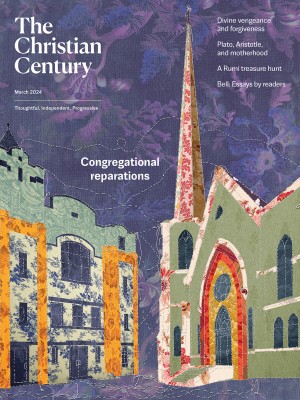Faith, hope, love, and AI
Our different responses to artificial intelligence point to different stories—and different Christian virtues.

(Century illustration (Source images: Getty)
We need to talk about artificial intelligence. We can divide responses to AI into three groups. Let’s call them Not on Your Life; Yes, Please; and Yes, But. Each of these groups has an implied story.
Not on Your Life anticipates the moment when AI reaches what’s known as the singularity, the point where technological development reproduces itself, uncontrollably and irreversibly, almost inevitably dominating human civilization. Stephen Hawking described our situation as like receiving a message from a superior alien civilization saying, “We’ll arrive in a few decades.” He said that so far we’re replying, “OK, call us when you get here—we’ll leave the lights on.” The Not on Your Life story is not one in which some of us are losers; it’s one in which we all are. It sees the takeover of the human domain by computers and robots as simply a matter of time.
The story of Yes, Please is rooted in science fiction. This is an optimistic Silicon Valley story, one in which humans can eventually gain mastery over all limitations. It’s a story closely linked to transhumanism, the attempt to extend human life span and cognitive capability. It sees life as surrounded by unnecessary constraints and AI as a unique opportunity to overcome many of those constraints.
Read our latest issue or browse back issues.
The story of Yes, But isn’t fundamentally opposed to AI. It’s a story of how all new technologies tend to exacerbate the power differentials already at play in the world. Computer analysis reflects the data it is analyzing: bias against migrants, children, members of Indigenous communities, and people with disabilities could quickly be exacerbated rather than diminished by AI. It could be hardwired into employment screening or police records. At the simplest level, humans come to depend so much on AI that we can no longer think critically for ourselves, like a person who lives on fast food losing the ability to cook.
As is often the case, Christians responding to challenges from social innovation are engaged in a clash of stories. Let’s take the three stories and see what’s at stake in each of them.
With the Not on Your Life story, what’s really at stake is the Christian virtue of hope. Hope says human beings will never create a good outcome to their own story, neither individually by concocting their own survival in a robot nor collectively by creating an idealized utopia. Instead, God brings the future toward us and ushers us into ultimate companionship with the Trinity, one another, and the new creation, in spite of and uninhibited by our selfishness and fear. We can’t know if AI will eradicate humankind, but we can trust that it won’t eliminate God. The truth is that humankind will die out eventually, by external catastrophe or internal folly. But hope informs us that what God has in store for us individually and collectively is so much more than what we now have—and that our ultimate future lies in God’s hands, not ours.
In the Yes, Please story, what’s at stake is the Christian virtue of faith. The Yes, Please story is essentially a remix of an ancient tendency to seek eternal survival through escape—escape from the human body, from the limitations of time and space, from the sheer givenness of the world. The inclination to escape isn’t a new thing for those obsessed with technological enhancement; it’s been there since religion began. What faith says is that God is with us in and through our created existence: seeking technological escape by transcending our human limitations won’t get us any closer to God or eternity. Christianity fundamentally says we don’t get close to God by escape—we get close to God by God in Christ coming close to us. Transhumanism is an impossible project; more importantly, even if it succeeded in preserving parts of us, it would leave behind the parts most worth having.
Which brings us to the Yes, But story. The Yes, But story isn’t wrong. It’s just insufficient. There’s a bigger story, expressed by the Christian virtue of love. The story of love is that human beings were created for relationship—with God, and meanwhile with themselves, one another, and the creation. The most important thing in life is forming, fostering, and restoring relationship. Which means we have a simple test for whether innovations in AI or anything else are positive or negative: Do they strengthen, deepen, and enrich relationship? Or inhibit, evacuate, and dismantle it? The Yes, But approach wants us to legislate safeguards and protocols around AI. That’s wise and necessary. But let’s not for a moment suppose you can legislate love. That’s something we each have to practice, promote, and proclaim.
Some technological developments are healthy, some less healthy. The point is, the way we know whether they’re healthy is the extent to which they facilitate faith, hope, and love. So AI is testing the church as to whether it truly believes that faith, hope, and love are what we’re made for. What Christians need to assert and embody and enrich is the quality of their relationships with God, one another, and the creation. AI is showing us the difference between artificial love and real love.
And here lies a question and an irony. The question is, Do we make those relationships the gravitational center of our lives, right now, or are we already preoccupied with securing control, identity, and survival by other means? The irony is, maybe it’s going to take the threat of AI to make us realize what’s most important in life lest we lose it. The threat of AI may turn out to be a gift that shows us what our lives should really have been about all along.






